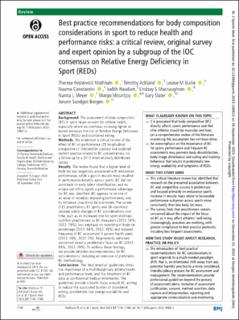| dc.contributor.author | Mathisen, Therese Fostervold | |
| dc.contributor.author | Ackland, Timothy | |
| dc.contributor.author | Burke, Louise M. | |
| dc.contributor.author | Constantini, Naama | |
| dc.contributor.author | Haudum, Judith | |
| dc.contributor.author | Macnaughton, Lindsay S. | |
| dc.contributor.author | Meyer, Nanna L. | |
| dc.contributor.author | Mountjoy, Margo | |
| dc.contributor.author | Slater, Gary | |
| dc.contributor.author | Sundgot-Borgen, Jorunn | |
| dc.date.accessioned | 2024-03-07T14:45:50Z | |
| dc.date.available | 2024-03-07T14:45:50Z | |
| dc.date.created | 2023-09-27T09:01:29Z | |
| dc.date.issued | 2023 | |
| dc.identifier.citation | British Journal of Sports Medicine. 2023, 57 (17), 1148-1160. | en_US |
| dc.identifier.issn | 0306-3674 | |
| dc.identifier.uri | https://hdl.handle.net/11250/3121467 | |
| dc.description.abstract | Background: The assessment of body composition (BC) in sport raises concern for athlete health, especially where an overfocus on being lighter or leaner increases the risk of Relative Energy Deficiency in Sport (REDs) and disordered eating. Methods: We undertook a critical review of the effect of BC on performance (29 longitudinal, prospective or intervention studies) and explored current practice related to BC considerations via a follow-up to a 2013 internationally distributed survey. Results: The review found that a higher level of body fat was negatively associated with endurance performance, while a gain in muscle mass resulted in performance benefits across sports. BC did not contribute to early talent identification, and no unique cut-off to signify a performance advantage for BC was identified. BC appears to be one of an array of variables impacting performance, and its influence should not be overstated. The survey (125 practitioners, 61 sports and 26 countries) showed subtle changes in BC considerations over time, such as an increased role for sport dietitian/nutrition practitioners as BC measurers (2013: 54%, 2022: 78%); less emphasis on reporting of body fat percentage (2013: 68%, 2022: 46%) and reduced frequency of BC assessment if ≥every fourth week (2013: 18%, 2022: 5%). Respondents remained concerned about a problematic focus on BC (2013: 69%, 2022: 78%). To address these findings, we provide detailed recommendations for BC considerations, including an overview of preferable BC methodology. Conclusions: The ‘best practice’ guidelines stress the importance of a multidisciplinary athlete health and performance team, and the treatment of BC data as confidential medical information. The guidelines provide a health focus around BC, aiming to reduce the associated burden of disordered eating, problematic low energy availability and REDs. | en_US |
| dc.language.iso | eng | en_US |
| dc.publisher | BMJ Publishing Group Ltd | en_US |
| dc.rights | Navngivelse-Ikkekommersiell 4.0 Internasjonal | * |
| dc.rights.uri | http://creativecommons.org/licenses/by-nc/4.0/deed.no | * |
| dc.subject | athletes | en_US |
| dc.subject | body composition | en_US |
| dc.subject | body image | en_US |
| dc.subject | feeding and eating disorders | en_US |
| dc.subject | relative energy deficiency in sport | en_US |
| dc.title | Best practice recommendations for body composition considerations in sport to reduce health and performance risks: a critical review, original survey and expert opinion by a subgroup of the IOC consensus on Relative Energy Deficiency in Sport (REDs) | en_US |
| dc.type | Peer reviewed | en_US |
| dc.type | Journal article | en_US |
| dc.description.version | publishedVersion | en_US |
| dc.rights.holder | © Author(s) (or their employer(s)) 2023. | en_US |
| dc.subject.nsi | VDP::Medisinske Fag: 700::Idrettsmedisinske fag: 850 | en_US |
| dc.source.pagenumber | 1148-1160 | en_US |
| dc.source.volume | 57 | en_US |
| dc.source.journal | British Journal of Sports Medicine | en_US |
| dc.source.issue | 17 | en_US |
| dc.identifier.doi | 10.1136/bjsports-2023-106812 | |
| dc.identifier.cristin | 2179199 | |
| cristin.ispublished | true | |
| cristin.fulltext | original | |
| cristin.qualitycode | 2 | |

